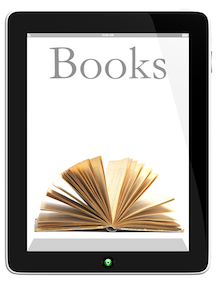By Sophie Lewis
October is national arts and humanities month, and what better way to celebrate it than by talking about books? With the invention of the Kindle and society’s rapidly-increasing dependence on e-readers, that conversation looks very different than it did just ten years ago. Instead of flipping a page we press a button, and instead of going to the library we look up the online edition on our screens. The transition of the book publishing industry into the online realm has proven to be a boon in many ways for academics, students, and lovers of knowledge everywhere; I can access a dissertation prepared by a Ph.D. student at the University of Stellenbosch in South Africa with a click of my mouse, and I can find half a dozen editions of Aristotle’s Poetics when I’m writing a paper late into the evening after the libraries on my campus have closed.
E-reading opens us to channels of knowledge with a largesse of offerings that proves dizzying to catalog. With the overabundance of information, however, come several challenges. In a recent article in The New Yorker, Maria Konnikova describes a physiological shift in reading itself when we do it via screen, rather than print, “The screen […] seems to encourage more skimming behavior: when we scroll, we tend to read more quickly (and less deeply) than when we move sequentially from page to page.” Accustomed to the busy nature of website layouts and crowded computer desktops, our brains often notice and focus upon more than one stimulus at a time in an e-reading environment, which causes us to gather the gist of the article rather than absorb every word.
The “browse and scan” method of reading, as Konnikova calls it, can be a more effective method than traditional line-by-line perusal. Reading quickly is essential when we are pressed for time and must process information efficiently. E-reading, however, does not encourage lingering and rereading, which is often necessary to truly absorb knowledge and critically analyze a text. In my own educational experience, my professors often tell students in seminars that they have a policy against e-readers because they are too big a distraction for students. Naomi S. Baron’s July 2014 article in the Chronicle of Higher Education seems to corroborate my professors’ intuitions. Baron has studied reading effectiveness in college students all over the world and has found that e-reading diminishes the effectiveness of something she calls “deep reading,” which is a type of reading that involves rereading, annotating, and musing over a text at length to decipher meaning.
Alan Jacobs’s 2012 article in The Atlantic on the evolution of e-readers highlights the fact that digital book technology has surpassed traditional reading in terms of ease and functionality (he lauds the ability to read in the dark and the lightweight ease of carrying 300 books in a single slim package), but points out that reader-book interactions are far superior in print reading. Jacobs argues that students are already reticent to write in their books, as an instructor of literature for many decades he had to try a plethora of methods to “get students to write in their books in meaningful and useful ways.” Jacobs laments the fact that recent iterations of the Kindle and Nook software are making it more and more difficult to annotate, and anyone who has attempted to highlight while reading on a tablet knows how difficult it is to precisely select a passage. According to Jacobs, Responsive reading seems to be continually forgotten from discussions of e-reading and user preference.
With Amazon releasing more and more titles for Kindle every day and the robust amount of scholarship dedicated to digital humanities, it is evident that e-reading is here to stay. As we pull out our tablets on the subway to “flip” through a few pages on our morning commute, however, it is important to maintain a critical attitude towards our reading experience. Not all readers are the same, and neither are all types of reading. As we become more and more dependent upon e-reading, we have to learn to adapt our reading styles to account for both the limitations and advantages of digital reading.
Sophie Lewis is senior at Barnard College majoring in Music and English. Barnard College of Columbia University is home to the Delta of New York chapter of Phi Beta Kappa.




